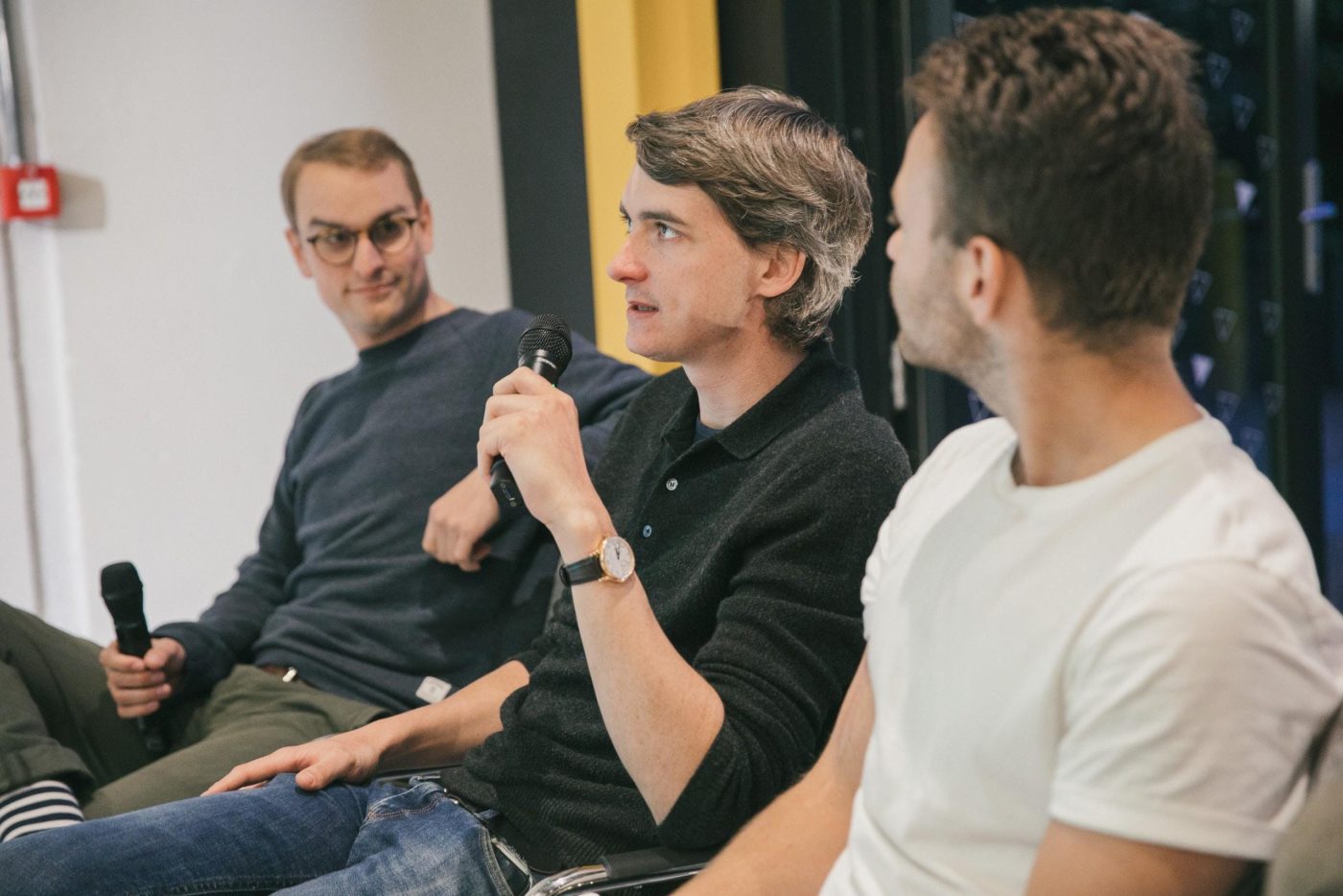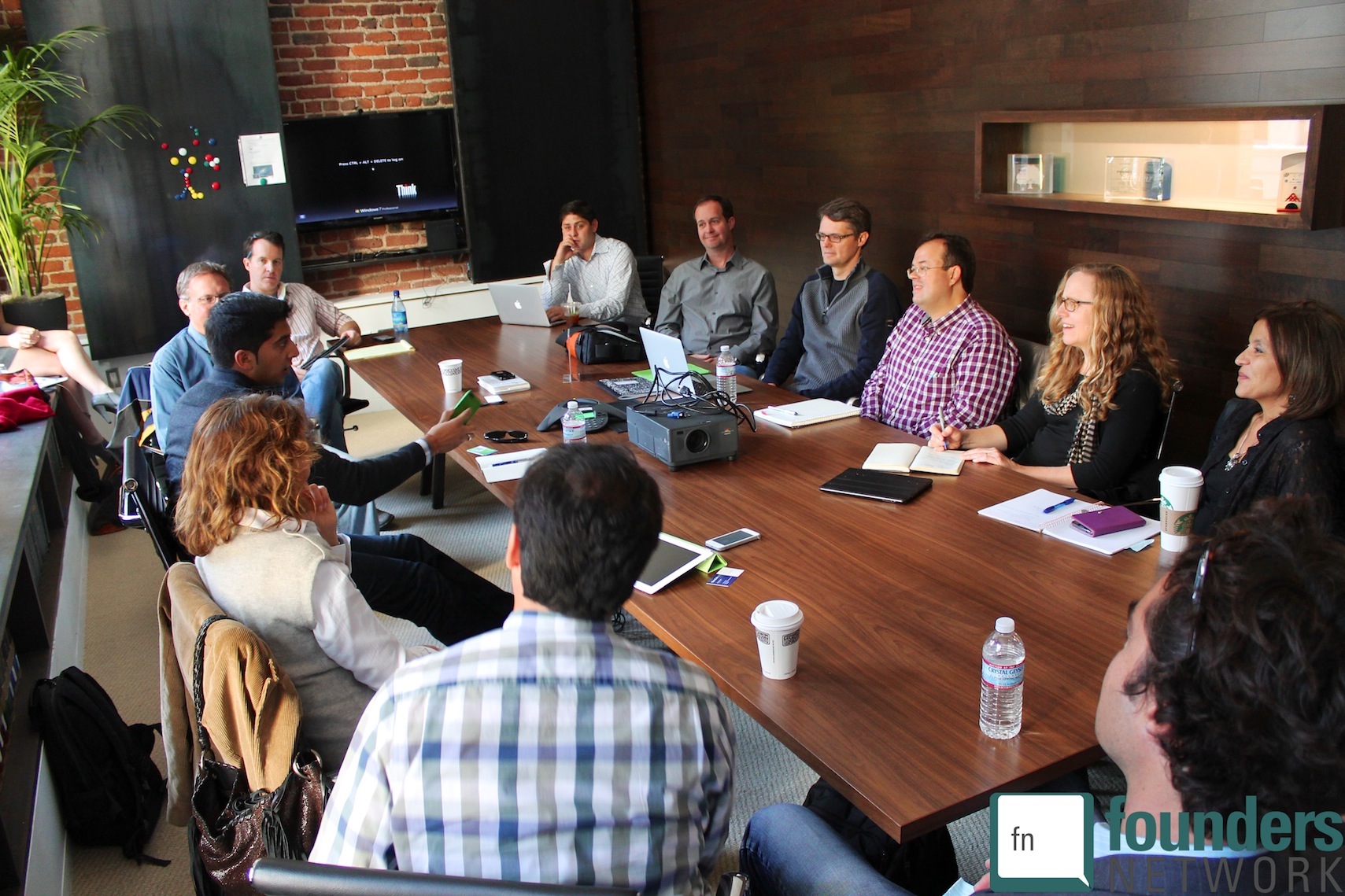
We sat one VP, two VC’s, a lawyer, two founders and a banker down on a couch and called it The Path to Payday, our Spring Social. What began as a standard panel quickly devolved (or evolved, depending on perception), into an intimate and honest discussion.
Key takeaways:
- Why building a real relationship with an investor is critical to landing funding
- How to approach valuation in a term sheet
- Why accepting funding too early can be a huge mistake
- Why protecting your cap table is crucial
Panelists included: Joshua Krammes, VP of Business Development at MergerTech; BJ Lackland, CEO of Lighter Capital; Villi Iltchev, Partner at August Capital; Jonathan Storper, Partner at Hanson Bridgett; Colin Barceloux, CEO and Co-Founder of Convoy; and Chad Brubaker, Founder of OneRooftop. Moderated by Basant Kedia, Managing Director of First Republic Bank.
Investment is a marriage, not a date.
Shelling out $50 for dinner isn’t the same as a down payment on a house. Sure, the value of one is much higher than the other. But the real difference is trust. You split a meal with someone, there’s a check at the end and you’re done, no trust necessary, no follow-up. You buy a house with them, you’re locked into a lasting contract. According to the panelists, building the trust necessary to take that dive is the key to securing an investment.
“Most likely, if someone just cold pitches to me, I won’t invest”, claimed Villi Iltchev, “we need to have established some kind of relationship beforehand. These things take time”.
Nodding in consent, BJ Lackland drove the point home, “Investment is a very relationship driven business. If you come out pitching, an investor can’t build a relationship with you. It’s important to create that”.
But how to build those relationships?
“It’s simpler than people think”, said Rakesh Tondon (Feb ’13, Co-founder & CEO, LE TOTE), “Find investors that believe in your mission and vision. If the conversation starts off with an investor not believing in you or your market, it’s going to be a waste of time. More importantly, make sure you like these people. Bringing on an investor is a marriage, not a date. Like any marriage, make sure your investor can contribute more than just money. Is there a certain area of your business they can help with? There has to be more than a check involved. There needs to be give and take on both sides”.
Bringing on an investor is a marriage, not a date. –@rakeshtondon
Avoid cold pitching if you can, and more importantly, find a good fit. Investors and founders don’t just spend time together, they spend money, and share vision, and collaborate. This requires compatibility.
“I should have started meeting with investors from day one, before getting the traction that I have now”, said Anthony Poston (Founder & CEO, WhichWinery), “Not to fundraise, just to network and collaborate. Building those relationships over the past two years would make our current fundraising efforts much simpler”.
Don’t take money for money’s sake
When there’s $2M on the table, it’s easy for judgement to get clouded. Chad Brubaker (Founder, OneRooftop) warned against accepting funds from the wrong VC, at the wrong time.
“You can trip yourself up by taking money from an investor who has a different idea of what you’re doing” said Chad, “know where you’re going and match with an investor who will help you along the way. It’s frustrating as an entrepreneur to see people claiming that raising money equals success. It doesn’t. Growth equals success”.
Raising money doesn’t equal success. Growth equals success. – @OneRooftop
Too often, founders fall in to the trap of short-sightedness, neglecting to focus on the long-term goals for their startup. “In their pitch, a lot of founders just talk about the business”, said Rakesh, “But it’s important to lay out the long term vision: This is where we are today, this is where we’re trying to go, and this is how we’re going to reach that north star”.
Beyond vision, securing the right investment involves the right type of firm, as Colin Barceloux, (CEO and Co-Founder, Convoy) pointed out, “When you’re going for seed investors especially, the best thing is to go with firms designated for that. It’s not always good to go with a big VC firm when you’re looking for seed funding. That might be risky and set a bad expectation”. Meaning flat rounds aren’t the end of the world, but down rounds can mean the end of a startup.
“The panelists brought up a great point”, said Anthony after the event, “If you’re going to get involved with a VC, you better be ready. Be ready to get replaced as the CEO of your own company, be ready to answer to a board, be ready to not be the only opinion that matters in your business. Be realistic about your limitations, and willing to step aside and take advice if someone else can do it better”.
Term sheets: A good valuation doesn’t equal a good deal
VC’s aren’t out to screw over founders. They want to build lasting relationships with the people they invest in. But, it’s a VC’s job to get a good deal, and there won’t be any hand holding while drafting a term sheet.
“Valuation is arguably the most important part of your term sheet”, said Jonathan Storper, Partner at Hanson Bridgett.
A poor valuation can ruin a deal, even if the other terms are in a founder’s favor. On the other hand, a good valuation doesn’t always mean the deal is solid.
“Many founders assume that a good valuation equals a good deal”, said Joshua Krammes (VP at MergerTech), “but it’s not that simple”.
Setting the bar too high initially can mean failure down the road. If a valuation is not met or passed by the next fundraising round, it puts the founder in a very bad position.
“Work parameters into your contract to avoid the mess of taking funding too early, and needing it more later on”, said Chad Brubaker. “Make sure you’re getting a follow up on your investment,” he added.
Approaching valuation with a clear head is critical. Setting a number that works for both VC and founder means taking your startup’s industry and stage into consideration. Do research on similar startup’s valuations, and have realistic expectations going in to a term sheet negotiation.
A good valuation doesn’t always equal a good deal – @JoshuaKrammes
Protect your cap table
It’s all too common for founders to dismiss the formation of their cap table, or not fully understand what it is altogether. The consensus of the panel— protect your cap table at all costs. This broke down into two main points: keep it simple and organized, and when it doubt, talk to your lawyer.
“You should be able to easily determine who owns what securities”, said Jonathan Storper. This means keeping your cap table free to unnecessarily information to avoid confusion down the line. A cap table needs to be kept current to inform proper decision making, so don’t overload it with information.
It might seem costly, but bringing on a lawyer to review your cap table is a necessity. The hypothetical transactions that a cap table can include (M&A, sales of the company, public offerings), have serious implications for a startup down the line.
Founder Takeaways
The panelists were honest and straightforward, and most importantly, FN’ers walked away with tangible knowledge of the current investment landscape. “They gave it to us straight”, said Anthony Poston, “I walked away with ideas, and I know I’m ready to add a VC to my team without fear of them impacting our vision or culture”.
A huge thanks to FN member Rony Chammas, founder of PeerSpace, for hosting us.





